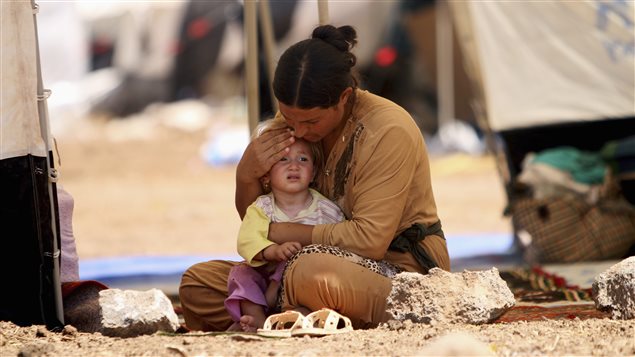
A refugee woman from the minority Yazidi sect, who fled the violence in the Iraqi town of Sinjar, sits with a child inside a tent at Nowruz refugee camp in Qamishli, northeastern Syria August 17, 2014. Photo Credit: Rodi Said / Reuters
In the last week there have been mass graves discovered in Iraq. There is little detail on who the 400 people found buried are, why they were executed or what group they belonged to, but just that they were victims of ISIS and their location. This story and many linked to the atrocities in Iraq and Syria did not receive as much coverage as they should have considering how similar events in history have scarred the psyche of all democratic nations. The civilian targets of ISIS have often been minority groups in the region that were seen as less than human in ISIS philosophy and that did not have a strong militia protecting their communities. If you were born into such a group by no choice of your own, the worst punishments were applied to you and your family. Memories of those victims of religious fervor that suffered in the Spanish Inquisition have shaped human rights norms and codes along with other historic events in Western history. In these recent cases that can be argued as some of the worst treatment girls and women have faced in human history, there has been a passive approach to protecting their lives.
No one should be burned alive because they would not convert to a religion, but it occurred frequently under ISIS and little was said in Western media in most cases. Sexual assaults against minors daily and the execution of relatives in front of them was standard practice, occurring on a massive scale, in many cases resulting in those girls being burned alive themselves. Every violation of the UN Universal Declaration of Human Rights was committed using the most extreme methods, and in most cases these atrocities were given a page twelve storyline, if published at all. Their protection was treated as a page twelve storyline as well, with the protectors of many of those minorities, the Peshmerga, now being attacked from all of its neighbours as a reward for attempting to be the only militia that tried to protect minorities from human rights abuses.
Rwanda was a tipping point in how we handle genocide in modern times. Rwanda was almost completely ignored, but awareness of the atrocities was well known as UN representatives were on the ground during the genocide and were communicating with their respective governments, and nothing was done to stop it. Many of these same leaders that ignored the genocide in Rwanda are active in governments around the world today, or advise modern governments on policy and are key contributors in developing legislation and UN actions. These same leaders also impressed their shame on their lack of actions in stopping the Rwandan Genocide, but also have done little to help Yazidis and other minorities in Iraq and Syria. They are well aware of what is going on as video and photos of atrocities are broadcast on social media frequently. Their passive attention post-Rwanda to genocide is passively permitting another Inquisition. The policy approach to do nothing about returning citizens who committed these acts against minorities in the Middle East has also fallen on deaf ears. Allowing those who have orchestrated the worst human rights abuses in human history to pass between borders without trial and with complete freedom is an insult to every victim of genocide since the Spanish Inquisition as well.
One of the shameful events that shaped human rights globally, the Inquisition, was occurring yet again, but we are blinded to it in modern society. Perhaps future generations will learn from our mistakes, but there is no doubt that modern society have failed the minorities in Iraq and Syria as regret replaces action, and shame is assured on us by future generations.